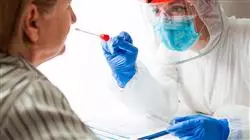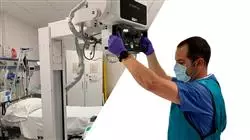University certificate
The world's largest faculty of nursing”
Introduction to the Program
Apply in your work the best techniques in Diagnostic and Therapeutic Processes, deepening in aspects such as intravenous perfusions or electrocardiographies"

Recent changes in the functioning of the different hospital processes have also affected the work of the nurse. The pandemic situation has accelerated numerous health transformations. Hospitals have been one of the healthcare centers where the greatest changes have taken place. And, with them, services such as nursing. Thus, this Postgraduate certificate delves into the new techniques and procedures that the nurse must know in order to face the diagnostic and therapeutic processes.
Through a 100% online teaching system, taught by the best teachers, professionals will be able to update their knowledge in a comfortable and simple way. You will choose the time and place to study, and you will have at your disposal 24 hours a day all the materials and didactic resources of the program. Thus, from an eminently practical approach, the nurse will enjoy numerous activities, videos, interactive summaries and case studies, among many other materials.
With this learning method it will be easy to access the most advanced content, so that the professional can quickly get up to date on issues such as prevention of nosocomial infections, catheterization and drainage of the patient, oxygen therapy and aerosol therapy or care in the administration of drugs.
This program will allow you to adapt to the latest developments in Diagnostic and Therapeutic Processes in the Hospital Setting, integrating the latest procedures into your daily practice"
This Postgraduate certificate in Diagnostic and Therapeutic Processes in the Hospital Setting for Nursing contains the most complete and up-to-date scientific program on the market. Its most notable features are:
- The development of case studies presented by experts in Hospital Nursing
- The graphic, schematic, and eminently practical contents with which they are created, provide scientific and practical information on the disciplines that are essential for professional practice
- Practical exercises where self-assessment can be used to improve learning
- Its special emphasis on innovative methodologies
- Theoretical lessons, questions to the expert, debate forums on controversial topics, and individual reflection assignments
- Content that is accessible from any fixed or portable device with an Internet connection
Advance professionally by incorporating the latest advances in hemodynamic care or antineoplastic drug delivery into your work”
The program’s teaching staff includes professionals from sector who contribute their work experience to this training program, as well as renowned specialists from leading societies and prestigious universities.
The multimedia content, developed with the latest educational technology, will provide the professional with situated and contextual learning, i.e., a simulated environment that will provide immersive training programmed to train in real situations.
This program is designed around Problem-Based Learning, whereby the professional must try to solve different professional practice situations that arise during the program. For this purpose, the student will be assisted by an innovative interactive video system created by renowned and experienced experts.
TECH's online methodology will allow you to study and work at the same time, without rigid schedules or interruptions in your professional work"

You will benefit from the best teachers, who will update you with numerous multimedia resources"
Why study at TECH?
TECH is the world’s largest online university. With an impressive catalog of more than 14,000 university programs available in 11 languages, it is positioned as a leader in employability, with a 99% job placement rate. In addition, it relies on an enormous faculty of more than 6,000 professors of the highest international renown.

Study at the world's largest online university and guarantee your professional success. The future starts at TECH”
The world’s best online university according to FORBES
The prestigious Forbes magazine, specialized in business and finance, has highlighted TECH as “the world's best online university” This is what they have recently stated in an article in their digital edition in which they echo the success story of this institution, “thanks to the academic offer it provides, the selection of its teaching staff, and an innovative learning method aimed at educating the professionals of the future”
A revolutionary study method, a cutting-edge faculty and a practical focus: the key to TECH's success.
The most complete study plans on the university scene
TECH offers the most complete study plans on the university scene, with syllabuses that cover fundamental concepts and, at the same time, the main scientific advances in their specific scientific areas. In addition, these programs are continuously being updated to guarantee students the academic vanguard and the most in-demand professional skills. In this way, the university's qualifications provide its graduates with a significant advantage to propel their careers to success.
TECH offers the most comprehensive and intensive study plans on the current university scene.
A world-class teaching staff
TECH's teaching staff is made up of more than 6,000 professors with the highest international recognition. Professors, researchers and top executives of multinational companies, including Isaiah Covington, performance coach of the Boston Celtics; Magda Romanska, principal investigator at Harvard MetaLAB; Ignacio Wistumba, chairman of the department of translational molecular pathology at MD Anderson Cancer Center; and D.W. Pine, creative director of TIME magazine, among others.
Internationally renowned experts, specialized in different branches of Health, Technology, Communication and Business, form part of the TECH faculty.
A unique learning method
TECH is the first university to use Relearning in all its programs. It is the best online learning methodology, accredited with international teaching quality certifications, provided by prestigious educational agencies. In addition, this disruptive educational model is complemented with the “Case Method”, thereby setting up a unique online teaching strategy. Innovative teaching resources are also implemented, including detailed videos, infographics and interactive summaries.
TECH combines Relearning and the Case Method in all its university programs to guarantee excellent theoretical and practical learning, studying whenever and wherever you want.
The world's largest online university
TECH is the world’s largest online university. We are the largest educational institution, with the best and widest online educational catalog, one hundred percent online and covering the vast majority of areas of knowledge. We offer a large selection of our own degrees and accredited online undergraduate and postgraduate degrees. In total, more than 14,000 university degrees, in eleven different languages, make us the largest educational largest in the world.
TECH has the world's most extensive catalog of academic and official programs, available in more than 11 languages.
Google Premier Partner
The American technology giant has awarded TECH the Google Google Premier Partner badge. This award, which is only available to 3% of the world's companies, highlights the efficient, flexible and tailored experience that this university provides to students. The recognition as a Google Premier Partner not only accredits the maximum rigor, performance and investment in TECH's digital infrastructures, but also places this university as one of the world's leading technology companies.
Google has positioned TECH in the top 3% of the world's most important technology companies by awarding it its Google Premier Partner badge.
The official online university of the NBA
TECH is the official online university of the NBA. Thanks to our agreement with the biggest league in basketball, we offer our students exclusive university programs, as well as a wide variety of educational resources focused on the business of the league and other areas of the sports industry. Each program is made up of a uniquely designed syllabus and features exceptional guest hosts: professionals with a distinguished sports background who will offer their expertise on the most relevant topics.
TECH has been selected by the NBA, the world's top basketball league, as its official online university.
The top-rated university by its students
Students have positioned TECH as the world's top-rated university on the main review websites, with a highest rating of 4.9 out of 5, obtained from more than 1,000 reviews. These results consolidate TECH as the benchmark university institution at an international level, reflecting the excellence and positive impact of its educational model.” reflecting the excellence and positive impact of its educational model.”
TECH is the world’s top-rated university by its students.
Leaders in employability
TECH has managed to become the leading university in employability. 99% of its students obtain jobs in the academic field they have studied, within one year of completing any of the university's programs. A similar number achieve immediate career enhancement. All this thanks to a study methodology that bases its effectiveness on the acquisition of practical skills, which are absolutely necessary for professional development.
99% of TECH graduates find a job within a year of completing their studies.
Postgraduate Certificate in Diagnostic and Therapeutic Processes in the Hospital Setting for Nursing
.
Diagnostic and therapeutic processes in the hospital setting for nursing are a series of actions and procedures that are carried out by nursing staff to diagnose, treat and care for hospitalized patients.
Diagnostic processes include identifying the patient's symptoms and establishing a medical diagnosis. Nurses may perform tests and examinations to gather information about the patient's health, such as taking vital signs, blood and urine tests, X-rays, electrocardiograms and imaging tests. Once a diagnosis has been established, the nursing staff can work with the medical team to develop an individualized care plan for the patient.
Therapeutic processes include the treatment and care of hospitalized patients, which may include administering medications and performing medical procedures. Nurses are responsible for administering medications according to physician orders and monitoring their effectiveness and possible side effects. In addition, they may provide non-pharmacological therapies, such as physical therapy, occupational therapy and recreational therapy to help patients recover and improve their quality of life.
Processes also include ongoing assessment of the patient's condition and adapting the care plan as needed. Nurses should be alert to any changes in the patient's condition and immediately notify the medical team in the event of treatment complications.
Diagnostic and therapeutic processes in the hospital setting for nursing are a series of actions and procedures that enable nurses to diagnose, treat and care for hospitalized patients. The processes include identifying the patient's symptoms, performing tests and examinations, establishing a medical diagnosis, developing a plan of care, administering medications, monitoring the effectiveness of treatment, adapting the plan of care, and continually assessing the patient's condition.







